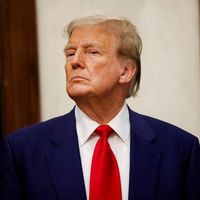In Friday prayers, state clerics praise wisdom of nuclear talks
Senior Iranian clerics signaled guarded optimism toward renewed indirect talks with the United States over Iran’s nuclear program, while voicing the Islamic Republic's uncompromising stance on national sovereignty and sanctions relief.
Speaking at Friday prayers in Tehran, interim Friday prayer leader Mohammad-Hassan Aboutorabi-Fard said that Iran’s nuclear policy is rooted in a religious and political doctrine that prioritizes peaceful development while resisting external pressure.
"The Islamic Republic’s strategy is based on transparency about the peaceful nature of its nuclear program, the development of nuclear technology, and the lifting of oppressive sanctions," he said.
His remarks come against the backdrop of renewed indirect negotiations between Tehran and Washington, facilitated by Oman, with the second round held in Rome and third slated for Muscat on Saturday.
According to Aboutorabi-Fard, the talks were initiated "at the repeated request of the highest-ranking US official and are proceeding with caution due to America’s repeated breaches of previous commitments, especially the unilateral withdrawal from the JCPOA in 2018."
Iranian Foreign Minister Abbas Araghchi has characterized the Muscat-hosted dialogue as a test of American sincerity. "The talks in Oman are a test to gauge the seriousness of the US," Aboutorabi-Fard quoted the minister as saying. "Complete sanctions relief and legal guarantees can pave the way for real progress."
The Omani Foreign Ministry, which hosted the recent talks in Rome, said the goal is to reach a “fair and lasting nuclear agreement” that ensures Iran is free of nuclear weapons and also free from sanctions—while maintaining its right to peaceful nuclear development.
Tehran views the Omani statement as aligning closely with its own strategic roadmap. "This declaration reflects the correct direction of negotiations in line with Iran’s strategy," Aboutorabi-Fard added.
The Tehran cleric, like several other Friday prayer leaders representing the Supreme Leader, portrayed the current diplomacy as a product of strength.
“Without the slightest doubt, the negotiations began from a position of dignity and power,” he said. “Iran has the upper hand in defining the topics and principles of the negotiations.”
Aboutorabi-Fard added that effective diplomacy must be backed by national strength—particularly technological and military power. “Diplomacy without power is ineffective in securing national interests,” he said. “The accumulation of scientific capacity, especially in nuclear technology, is one of the pillars of Iran’s national strength.”
He added that the country’s deterrent military capabilities bolster the negotiating team. “Our defensive power and enhanced deterrent strength are reliable assets for the Muscat negotiations.”
While advocating for the removal of sanctions, Aboutorabi-Fard echoed Khamenei’s frequent warnings against relying too heavily on external negotiations to solve domestic problems.
“Sanctions relief can help create conditions for sustainable economic growth,” he said, “but without transforming our economic and administrative structures, and without cutting the dependency of the budget on oil, real economic progress will remain out of reach.”
He urged the parliament and government ministers to focus on structural reforms regardless of the outcome of talks with the United States.
Other Friday prayer leaders across Iran echoed similar sentiments, praising Iran’s scientific achievements while cautioning against overreliance on diplomacy.
The cleric in Ilam quoted Khamenei, saying: “The diplomacy apparatus should do its work, but don’t tie the country’s future to the negotiations.”
In Yezd, Mohammad-Reza Naseri warned: “Don’t trust the enemy’s slogans. Real progress comes from self-reliance and heeding the Leader’s advice.”
And in Shiraz and Shahrud, Friday prayer leaders marked the anniversary of the failed US military operation in Tabas in 1980 -- Operation Eagle Claw -- as a reminder of “divine protection” and resilience against foreign intervention.
Mashhad firebrand cleric Ahmad Alamolhoda questioned whether, "After witnessing so many miracles, is it right to still hinge our hopes on America as a problem solver?""Conditioning our lives on negotiations demonstrates a lack of faith in God's power."







